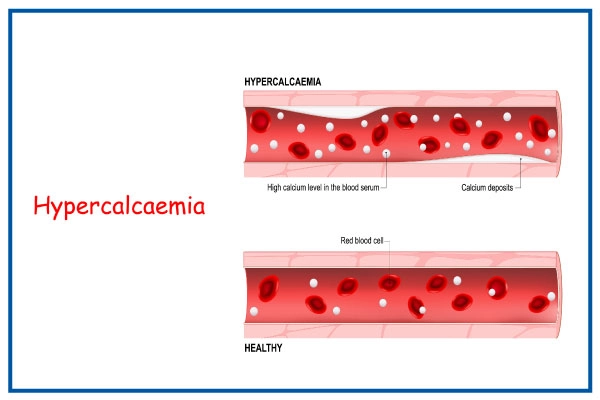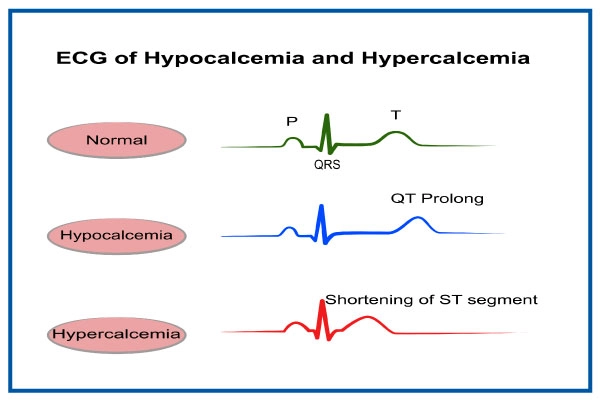Symptoms
If your hypercalcemia is minor, you might not have any signs or symptoms. In more severe cases, the portions of your body that are impacted by the excessive calcium levels in your blood show signs and symptoms such as
- Problems in digestion :
Constipation, nausea, vomiting, and stomach discomfort can all be brought on by hypercalcemia.
- Muscles and bones :
The excess calcium in your blood is typically leached from your bones, weakening them. Both bone pain and muscle weakening may result from this.
- Brain :
Confusion, drowsiness, and exhaustion are side effects of hypercalcemia, which can affect how your brain functions. It may also lead to depression.
- Heart :
Even though rare, severe hypercalcemia might affect your heart's ability to pump blood, resulting in palpitations, fainting, cardiac arrhythmia, and other heart issues.
When to See a Doctor?
If you experience any indications or symptoms of hypercalcemia, such as severe thirst, frequent urination, or abdominal pain, speak with your doctor at once.Get the best treatment for Hypercalcemia from the top Endocrinologist at Medicover Hospitals.
Causes and Risk Factors
Calcium aids in strengthening bones and teeth, contracting muscles and signalling of neurons. When your blood doesn't contain enough calcium, your parathyroid glands release a hormone that can trigger the following:
- Calcium will be released by the bones into the blood.
- Excess calcium absorbtion by your digestive system.
- Vitamin D, which is essential for calcium absorption, to be more active and your kidneys to excrete less calcium.
Numerous causes have the potential to upset the delicate balance between having too little calcium in your blood and hypercalcemia. Causes of hypercalcemia include
- Excessive parathyroid gland activity (hyperparathyroidism) :
The most frequent cause of hypercalcemia is an increase of one or more of the four parathyroid glands or a tiny, noncancerous (benign) tumor.
- Cancer :
Your risk of hypercalcemia may increase if you have breast cancer, lung cancer, or some blood malignancies. Your risk is also increased if cancer spreads (metastasizes) to your bones.
- Other illnesses :
Some health conditions such as TB and sarcoidosis can cause an increase in vitamin D in the blood levels. This prompts the digestive system to absorb more calcium.
- Inherited traits :
Familial hypocalciuric hypercalcemia is a rare hereditary condition that results in an increase in blood calcium levels due to malfunctioning calcium receptors. Hypercalcemia-related symptoms or consequences are not brought on by this disorder.
- Immobility :
Hypercalcemia can occur in people who have a disease that makes them spend a lot of time lying down or sitting still. Over time, calcium is released into the blood from non-weight-bearing bones.
- Dehydration :
Dehydration is a frequent contributor to mild or transitory hypercalcemia. The amount of calcium in your blood increases when there is less fluid present.
- Medications :
Some medications, including lithium, which is used to treat bipolar disorder, may cause an increase in parathyroid hormone secretion.
- Supplements :
Calcium levels in your blood can be elevated above normal by taking excessive calcium or vitamin D supplements over time.
Complications
Bacteria can attack a bone in a variety of ways, such as:
- Osteoporosis :
Osteoporosis: You may acquire the bone-thinning condition osteoporosis, which can result in bone fractures, spinal column curvature, and height loss if your bones continue to release calcium into your blood.
- Kidney stones :
Kidney stones: Your kidneys may develop crystals if the amount of calcium in your urine is too high. Kidney stones may eventually form when the crystals mix over time. A stone can be very unpleasant to pass.
- Renal failure :
Renal failure: Your kidneys may become damaged by severe hypercalcemia, reducing their capacity to purge the blood and eliminate fluid.
- Neurological issues :
Severe hypercalcemia can cause coma, dementia, and other potentially lethal symptoms like disorientation.
- Irregular heartbeat (arrhythmia) :
Irregular heartbeat (arrhythmia): The electrical impulses that control your heartbeat can be impacted by hypercalcemia, which can lead to an irregular heartbeat.
Diagnosis and treatment
You might not be aware that you have hypercalcemia until normal blood tests show a high level of blood calcium because the condition causes few signs or symptoms. Blood testing can also reveal whether you have hyperparathyroidism if your parathyroid hormone level is high.
Your doctor could advise imaging studies of your bones or lungs to ascertain whether the cause of your hypercalcemia is a condition like cancer or sarcoidosis.
If your hypercalcemia is minor, you and your doctor may decide to wait it out while keeping an eye on your bones and kidneys to ensure they stay in good shape.
Your doctor can suggest drugs or therapy for the underlying condition. This may include surgery for more severe cases of hypercalcemia..
Medications
In some circumstances, your doctor might advise:
Medications :
In some circumstances, your doctor might advise:
Calcitonin (Miacalcin) :
This fish hormone regulates the amount of calcium in the blood. One adverse effect can be mild nausea.
Calcimimetics :
Drugs of this kind can assist in regulating hyperactive parathyroid glands. Cinacalcet has been given the go-ahead to treat hypercalcemia.
Bisphosphonates :
Treatment for hypercalcemia brought on by cancer frequently involves intravenous osteoporosis medications, which can swiftly reduce calcium levels. Risks of this treatment include jaw breakdown and certain forms of thigh fractures.
Denosumab :
People with cancer-related hypercalcemia who don't respond well to bisphosphonates are frequently treated with this medication.
Prednisone :
Short-term use of steroid medications like prednisone is typically beneficial if your hypercalcemia is brought on by high amounts of vitamin D..
Diuretics and IV fluids :
A medical emergency could result from abnormally high calcium levels. You could require hospitalisation for IV fluid and diuretic therapy to quickly lower the calcium level and stop heart rhythm issues or nervous system damage.
Surgical and other procedures :
Surgery to remove the problematic tissue can frequently alleviate issues caused by hyperactive parathyroid glands. One of the four parathyroid glands is frequently impacted. An injection of a modest quantity of radioactive material is used in a specialized scanning test to identify the gland or glands that aren't functioning properly.
Lifestyle changes and self-care
Making some lifestyle changes can support healthy bones and appropriate calcium levels. These consist of
- Getting enough water to stay hydrated can help prevent kidney stones and lower blood calcium levels.
- Smoking might speed up the loss of bone. Quitting will lessen your risk of developing cancer and other diseases in addition to enhancing the quality of your bones.
- Exercising regularly can help, particularly resistance training as it encourages bone health and strength.
- Adhering to prescription drugs and supplement guidelines may reduce the chances of consuming too much vitamin D and developing hypercalcemia.
Dos and Don’ts
A person with Hypercalcemia must follow the below-mentioned do’s and don’ts to manage related symptoms and infections.
| Do’s | Don’ts |
| Exercise and stay active | Limit the salt intake |
| Follow your doctor’s medical prescription | Self medicate for symptoms |
| Drink a lot of water | Stop taking medications suddenly |
| Consult with your doctor before taking any medications | Take antacids that contain calcium |
| Avoid dairy products with added calcium | Forget to seek medical assistance if your condition doesn’t improve |
Precautions and self-care will help you fight this condition positively and improve your quality of life.
Hypercalcemia Care at Medicover Hospitals
At Medicover Hospitals, we have the most trusted team of doctors and medical experts who are experienced in providing excellent healthcare services to patients with compassion and care. Our diagnostic department is equipped with modern technology and equipment to conduct the tests required for the diagnosis of Hypercalcemia based on which a dedicated treatment plan is designed. We have an excellent team of Endocrinologists who diagnose and treat this condition with utmost precision and bring successful treatment outcomes.
Citations


